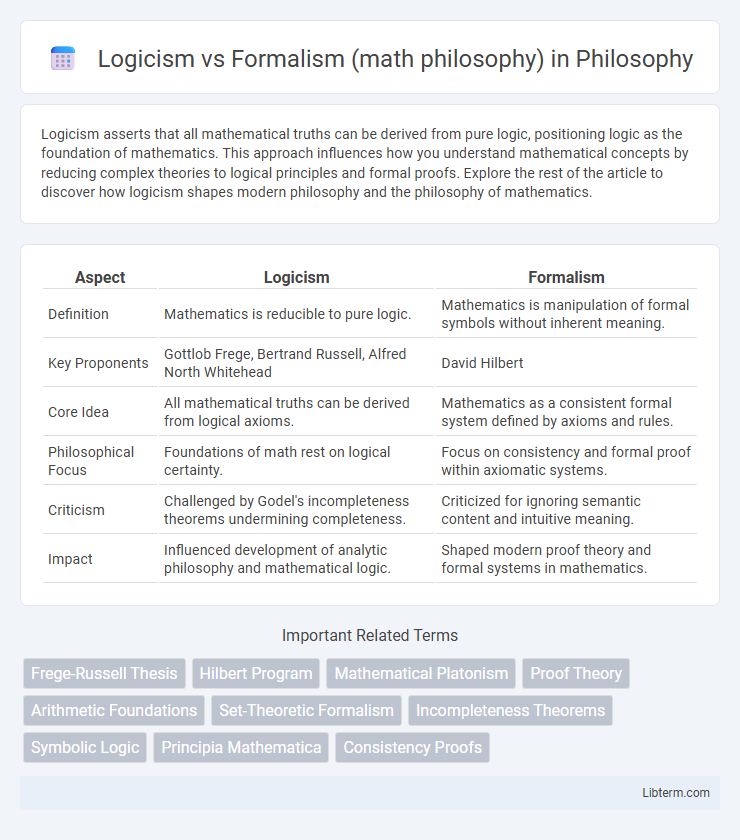Logicism asserts that all mathematical truths can be derived from pure logic, positioning logic as the foundation of mathematics. This approach influences how you understand mathematical concepts by reducing complex theories to logical principles and formal proofs. Explore the rest of the article to discover how logicism shapes modern philosophy and the philosophy of mathematics.
Table of Comparison
| Aspect | Logicism | Formalism |
|---|---|---|
| Definition | Mathematics is reducible to pure logic. | Mathematics is manipulation of formal symbols without inherent meaning. |
| Key Proponents | Gottlob Frege, Bertrand Russell, Alfred North Whitehead | David Hilbert |
| Core Idea | All mathematical truths can be derived from logical axioms. | Mathematics as a consistent formal system defined by axioms and rules. |
| Philosophical Focus | Foundations of math rest on logical certainty. | Focus on consistency and formal proof within axiomatic systems. |
| Criticism | Challenged by Godel's incompleteness theorems undermining completeness. | Criticized for ignoring semantic content and intuitive meaning. |
| Impact | Influenced development of analytic philosophy and mathematical logic. | Shaped modern proof theory and formal systems in mathematics. |
Introduction to Logicism and Formalism
Logicism, founded by Frege and advanced by Russell and Whitehead, asserts that mathematics can be reduced to pure logic, emphasizing axioms and logical inference to derive mathematical truths. Formalism, championed by Hilbert, views mathematics as manipulation of symbols according to formal rules without inherent meaning, focusing on consistency and completeness within formal systems. Both philosophies address the foundations of mathematics but diverge on whether mathematics is grounded in logic or symbolic formalism.
Historical Background of Mathematical Philosophy
Logicism, primarily developed by Gottlob Frege and later by Bertrand Russell, aimed to ground all mathematics in pure logic during the late 19th and early 20th centuries. Formalism, championed by David Hilbert, emerged as a response emphasizing mathematics as manipulation of formal symbols independent of meaning, establishing consistency through axiomatic systems. These competing philosophies shaped foundational debates in mathematical philosophy, influencing the development of proof theory and set theory throughout the 20th century.
Core Principles of Logicism
Logicism asserts that all mathematical truths can be derived from pure logic through formal logical systems, emphasizing the reduction of mathematics to logic. Its core principles include defining numbers and mathematical concepts purely in terms of logical constructs, relying on axiomatic sets and predicate logic to establish foundational consistency. This approach aims to eliminate ambiguity in mathematics by treating mathematical propositions as logical theorems provable within a rigorous logical framework.
Core Principles of Formalism
Formalism in the philosophy of mathematics asserts that mathematics is a manipulation of symbols according to specified rules without inherent meaning. It emphasizes the consistency and completeness of formal systems, treating mathematical statements as strings of symbols rather than truths about abstract objects. Key principles include the axiomatic method, where all mathematical truths are derived from a fixed set of axioms through formal proofs within a symbolic language.
Key Proponents and Their Contributions
Logicism, championed by Gottlob Frege, Bertrand Russell, and Alfred North Whitehead, posited that mathematics could be reduced to pure logic, exemplified in Russell and Whitehead's *Principia Mathematica*. Formalism, primarily advanced by David Hilbert, emphasized mathematics as a manipulation of symbols within a formal system without inherent meaning, aiming to establish consistency through finite, formal proofs. Both philosophies significantly influenced the foundation of mathematics by proposing distinct approaches to justify mathematical truths: logicism through axiomatic logic and formalism through formal proof systems.
Comparison of Logical Foundations
Logicism posits that mathematics is fundamentally reducible to pure logic, asserting that all mathematical truths can be derived from logical axioms and inference rules, as pioneered by Frege and later developed by Russell and Whitehead. Formalism, championed by Hilbert, treats mathematics as manipulation of symbols according to formal rules without necessarily attributing inherent meaning, emphasizing consistency and completeness within formal systems. The core comparison lies in logicism's reliance on logic as the foundation for mathematics versus formalism's focus on syntactic correctness and formal consistency, highlighting differing views on whether mathematical truth is discovered through logic or constructed through symbolic formalism.
Approach to Mathematical Truth and Proof
Logicism defines mathematical truth as reducible to logical truths, positing that all mathematical statements can be derived from pure logic through formal proofs. Formalism treats mathematics as a manipulation of symbols according to agreed-upon rules without intrinsic meaning, emphasizing consistency and proof within formal systems rather than truth in an absolute sense. Logicism seeks foundational certainty by grounding mathematics in logic, whereas Formalism prioritizes the internal coherence of formal systems over semantic interpretations of truth.
Criticisms of Logicism and Formalism
Criticisms of Logicism highlight its failure to fully reduce all mathematical truths to logic due to Godel's incompleteness theorems, which demonstrate inherent limitations in formal systems. Formalism faces critiques for its reliance on symbolic manipulation without guaranteeing semantic meaning, leading to questions about the actual truth of mathematical statements. Both philosophies struggle with providing a complete foundation for mathematics, as Logicism falters on the complexity of logic itself and Formalism ignores the ontological status of mathematical entities.
Impact on Modern Mathematics
Logicism, advocating that mathematics is reducible to pure logic, significantly influenced the foundation of computer science and formal language theory. Formalism, emphasizing mathematics as manipulation of symbols within axiomatic systems, shaped the development of proof theory and automated theorem proving. The interplay between these philosophies led to advancements in consistency proofs and formal verification methods critical for modern mathematical rigor.
Future Directions in Mathematical Philosophy
Future directions in the philosophy of mathematics emphasize integrating Logicism's foundational view that mathematics reduces to logic with Formalism's approach prioritizing formal systems and symbolic manipulation. Researchers explore hybrid frameworks combining Logicism's emphasis on logical truth with Formalism's model-theoretic methods to address foundational issues and the nature of mathematical proof. Advances in automated theorem proving and computational logic further drive this synthesis, potentially transforming the understanding of mathematical objects and the role of axiomatic systems.
Logicism Infographic

 libterm.com
libterm.com